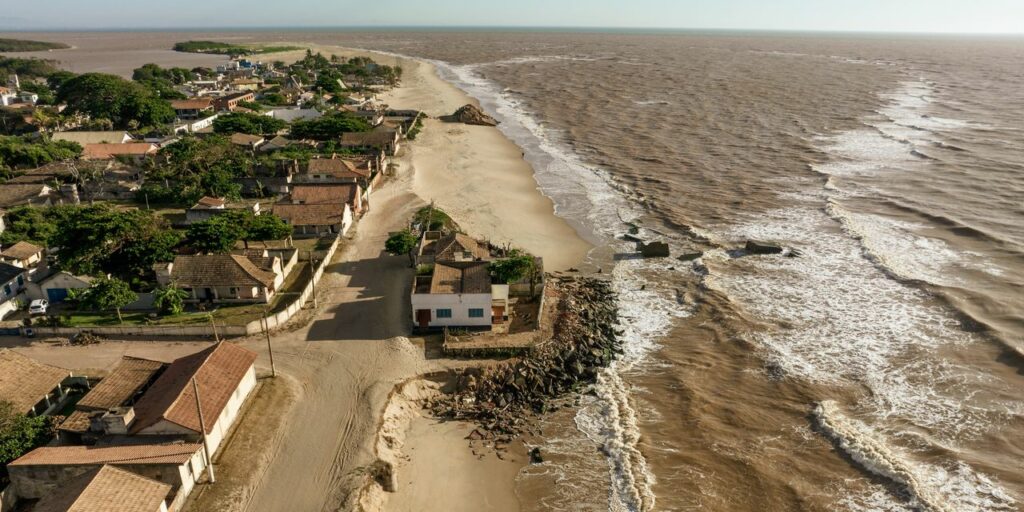When politicians tell you they are about to fix the weather, or indeed that they are about to do anything marvellous or even adequate, it is a good idea to ask what evidence they have given previously that they can do anything of the sort. For instance this fabled lurch to Net Zero. Reducing carbon emissions has been the cause du jour de la décennie du siècle since at least the 1992 Rio Earth Summit and absolutely since COP21 in Paris in 2015. And yet they tell us that we must urgently entrust them with the job because… atmospheric CO2 hit its “highest recorded level in human history” last month. Aka “since accurate measurements began 67 years ago” but who’s counting? Not them, apparently.
NBC tried, with:
“Earth's atmosphere hasn't had this much CO2 in millions of years/ New data shows that CO2 levels have broken through 430 parts per million, an indication that human-caused global warming will continue to warp the environment.”
And failed, writing:
“Earth’s atmosphere now has more carbon dioxide in it than it has in millions – and possibly tens of millions – of years, according to data released Thursday by the National Oceanic and Atmospheric Administration and scientists at the University of California San Diego. For the first time, global average concentrations of carbon dioxide, a greenhouse gas emitted as a byproduct of burning fossil fuels, exceeded 430 parts per million (ppm) in May.”
For starters, it’s not a byproduct. If it were, we could probably get rid of it as we did with, say, sulphur from burning certain kinds of coal. Also, if you don’t know if it’s millions or tens of millions we doubt you know much else. And then you write “For the first time” after saying it wasn’t the first time and we despair of your scientific knowledge.
Cliches you’re good at. For instance:
“Carbon dioxide, like other greenhouse gases, traps heat from the sun and can remain in the atmosphere for centuries. As such, high concentrations of greenhouse gases in the atmosphere contribute to higher global temperatures and other negative consequences of climate change, including rising sea levels, melting polar ice, and more frequent and severe extreme weather events.”
That sea levels are rising at the same languid pace as they have over the last 7,000 years or so, polar ice has stabilized and extreme weather events are not getting more frequent or more severe hardly matters, does it? Especially when you say stuff like CO2 “can remain in the atmosphere for centuries” which sounds ominous but means nothing.
Then we take issue with:
“Atmospheric carbon dioxide has risen sharply since preindustrial times, owing mostly to human activities that pump greenhouse gases into the air.”
Clearly these authors missed our item on the apple-cart-upsetting study that rivers are dumping huge amounts of carbon into the air whose isotopic signature is indistinguishable from that of fossil fuel combustion. (And the obvious point that everything before 1776 is “preindustrial” but 1850 is not.) But let the lurid prose roll on:
“Decades ago, crossing the 400 ppm threshold was unthinkable…. The planet hit that grim milestone in 2013. And now, scientists have warned that levels of CO2 could reach 500 ppm within 30 years. But human society is already in uncharted territory.”
Well, yes and no. The weather is pretty much the same as it was, and temperatures have risen marginally if at all.
It’s a bit peculiar, or at least we wish it were peculiar, that the news story does not link to the study so we could try to figure out why even professor Ralph Keeling, a professor of climate sciences, marine chemistry and geochemistry at UC San Diego’s Scripps Institution of Oceanography who “put out a statement”, waves his proxies vaguely about:
“The last time the planet had such high levels of carbon dioxide in the atmosphere was likely more than 30 million years ago, Keeling said, long before humans roamed Earth and during a time when the climate was vastly different.”
Oh wait. We do know. There’s no study. It’s just a press release about current levels of CO2. If it were a study, they’d have to say that 30 million years ago or so the Earth cooled rapidly while CO2 um uh gosh well it was way higher than today (they really should read our stuff), which “traps heat from the sun” and thus these high concentrations “contribute to higher global temperatures and other negative consequences of climate change including… melting polar ice” so it’s when the Antarctic ice sheet formed.
Oh. Science is hard. Darn.
P.S. Wikipedia tries to save the CO2 with “The causes of the Eocene-Oligocene transition are not yet fully understood.” But one “possibility, for which there is considerable evidence, is a drop in atmospheric carbon dioxide levels (pCO2) during the transition. The pCO2 is estimated to have dropped just before the transition, to 760 ppm at the peak of ice sheet growth, then rebounded slightly before resuming a more gradual fall. Climate modeling suggests that glaciation of Antarctica took place only when pCO2 dropped below a critical threshold value.” Namely 750 ppm. Hey, wait a minute…



Can they explain why there was no ice on Greenland during the Eemian interglacial warm period when CO2 was just 290 ppm?
When has our planet ever experienced a stable climate? We are currently experiencing an interglacial, which means the Earth is either emerging from or entering a period of extreme glaciation.
If we are still in the process of emerging, then slowly rising global temperatures and increasing sea levels should be expected as a normal progression. The same applies to receding glaciers and declining ice volumes at the poles.
If the interglacial has ended, the opposite would be observed, and we could expect a gradually worsening condition for life on this orb.
It would be best to hope that global warming is the climate change that will continue.
These articles written by alleged journalists are all filled with the exact same cliches such as "sparked", grim milestone and uncharted territory! Such alliterations are markers that an article is BS!
If the universe came into being very suddenly with all its energy and matter as is our best guess, the temperature must be decreasing as the universe expands. The earth only condensed from gas to solid about 5 billion years ago. Might the cooling of the universe be proved by entropy….if anyone still understands the scientific method.